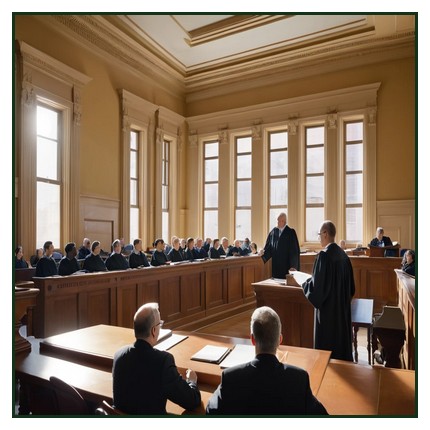
In a legal spectacle unfolding in Limerick, a jurisdictional dispute has emerged over a case concerning military service obligations. The proceedings, which took place at the courthouse in Pales on Tuesday, centered on allegations against John Ballyvourdon for his purported absence from the Reserve Forces in March of the previous year.
Presiding over the special court was Mr St. George, R.M., with a panel of magistrates including Messrs Ml. J.P., X. J. Power, B. J. P., and T. Lloyd, J.P. The prosecution was led by Mr J. Cusack, instructed by Mr J. V. Gaffney, C.B., while the defence was represented by Mr J. A. Rearden, instructed by Mr Power.
As the courtroom teemed with observers, including notable figures such as Mr T. Lunden, MP.., Lieut. J. London, and Mr Ryan, a procedural debate ensued. Mr Cusack commenced his address to Mr St. George, R.M., prompting Mr Rearden to voice a protest against the jurisdiction of the court. He argued that the case ought to be heard in a Court of Summary Jurisdiction rather than before the Resident Magistrate alone.
Mr St. George was pressed to assume the authority of a Court of Summary Jurisdiction, a power which, according to counsel, he was not entitled to wield. Mr Cusack referenced a prior English court ruling to support his stance, asserting that Mr St. George, having taken the original depositions, was rightfully entrusted with the case.
However, Mr Rearden contended that precedent in similar cases across Ireland had seen Resident Magistrates seeking the assistance of local Justices. He vehemently protested against what he perceived as a slight to the local magistrates in Co. Limerick, emphasizing their historical role in adjudicating such matters alongside Resident Magistrates.
Mr M. Quinlan, J.P., echoed this sentiment, expressing his strong objection to the attempt to sideline the local magistrates. He highlighted his tenure and dedication to the judiciary, emphasizing that the local Justices had consistently discharged their duties with integrity. Mr Quinlan characterized the move as an affront to the local magistrates, stressing their competence and track record in administering justice.
In response, Mr Cusack clarified that the dispute was purely a matter of legal interpretation, refuting any insinuation of disrespect towards the local magistrates.
The impassioned exchange underscored the complexity of legal procedures and the importance of jurisdictional clarity in judicial proceedings. As the case continued, it remained to be seen how the court would navigate the conflicting interpretations of legal authority.
Freeman’s Journal – Wednesday 01 November 1916

